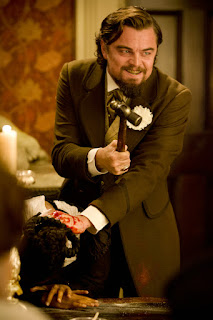Over
the past two decades Quentin Tarantino’s work has garnered a loyal
and enthusiastic following most filmmakers would kill for, but for every new
film to be saddled with so much expectation is hardly ever a good thing. After all,
for every Pulp Fiction and Kill Bill Vol. 1, there’s a Death Proof and Kill Bill Vol. 2, two films which may be stylish and intriguing in
their own right, but feel like crushing disappointments when compared to the ones
that preceded them.
By the same token, Django Unchained faces inevitable comparisons with Inglorious Basterds, Tarantino’s alternative
take on the WW2 flick which happened to be a big hit with critics, audiences
and award shows alike. But ideally every film should be judged on its own
merits, and while Basterds does at
times cast a giant swastika-shaped shadow on this 21st century
western, it is safe to say Django more
than earns its spurs.
In fact, despite all the Stetsons, horses and
gun-slinging on show, there’s an appealing fairytale quality to Django Unchained. As pointed out early
on by one character, the plot can be
viewed as a loose retelling of the Teutonic myth of Siegfried, which sees a
legendary warrior battle a monstrous dragon in order to save a damsel in
distress. Change the setting to pre-Civil War America, switch Siegfried with a freed
black slave and the dragon with a monstrous plantation owner and you’ve pretty
much got your movie. Adding further to the straightforward appeal is the fact
that Django also happens to be QT’s
most linear film to date, with none of the chronological reshuffling we’ve been
accustomed to in his previous work.
Much has been made already about the amount of
violence and N-bombs dropped throughout the film, but given the historical
setting, neither ever feels gratuitous. If anything, Tarantino is shedding
light on a sad chapter of history that is seldom portrayed onscreen, especially
when compared to the amount of holocaust films that are out there; he’s simply
just doing it with his trademark, unapologetic vehemence. If audiences cheered
at the sight of Jewish soldiers clubbing Nazis to death with baseball bats, it
is only natural African American viewers will feel thrilled and empowered at
the sight of Jamie Foxx beating a slave trader with his own whip. It is faux
historical gratification, and an entertaining one at that.
 As is the case with Tarantino, it’s the
characters that make the movie. Top of the bunch is no doubt the aforementioned
plantation owner Calvin Candie, played with repugnant charm by Leonardo
DiCaprio. A puerile emperor who takes great pleasure in forcing his slaves into
battles like doomed gladiators, Candie is the wicked heart and soul of the film
and just goes to show DiCaprio can play show-stealing villains just as well as
he plays flawed leading men. What’s more, he proves to be Samuel L. Jackson’s
best verbal sparring partner since John Travolta in Pulp Fiction – the scenes
between Candie and Jackson’s cranky house slave Stephen truly are the stuff of comedy. Christoph Waltz is enjoyable as Django’s mentor Dr.
King Schultz, but his presence is more due to his friendship with Tarantino than
the likelihood of crossing a German bounty hunter in Mississippi in 1858.
As is the case with Tarantino, it’s the
characters that make the movie. Top of the bunch is no doubt the aforementioned
plantation owner Calvin Candie, played with repugnant charm by Leonardo
DiCaprio. A puerile emperor who takes great pleasure in forcing his slaves into
battles like doomed gladiators, Candie is the wicked heart and soul of the film
and just goes to show DiCaprio can play show-stealing villains just as well as
he plays flawed leading men. What’s more, he proves to be Samuel L. Jackson’s
best verbal sparring partner since John Travolta in Pulp Fiction – the scenes
between Candie and Jackson’s cranky house slave Stephen truly are the stuff of comedy. Christoph Waltz is enjoyable as Django’s mentor Dr.
King Schultz, but his presence is more due to his friendship with Tarantino than
the likelihood of crossing a German bounty hunter in Mississippi in 1858.
And what about the titular slave and his damsel
in distress? Well, they’re the weak links in the chain. All Kerry Washington
gets is a brilliant name and hardly any dialogue as Broomhilda Von Shaft. It's a sore missed opportunity, considering Tarantino usually excels at writing cool female roles - and "Hildie" is no Bride, Shosanna or Mia Wallace.
As for Django himself, it’s not that Jamie Foxx is necessarily bad as the stoic
protagonist, he just isn’t quite as memorable as his co-stars – which makes you
wonder how casting runner-ups Will Smith and The
Wire’s Michael K. Williams would have fared in the role. Having said that,
Foxx does manage to convey the required amount of virility to portray a convincing
western hero; and there’s no denying he’ll get your blood pumping the moment he whips out his pistols and takes on a room full of goons to the triumphant sound of a Tupac/James Brown
remix. Now that is quintessential Tarantino for you, right there.
4/5

